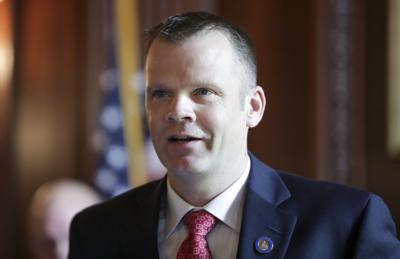Top Senate Republicans say they are working on a plan to cut income taxes for scores of Wisconsinites making less than $200,000 per household.
Speaking at an event Thursday organized by the news site Wispolitics.com, Senate Majority Leader Devin LeMahieu, R-Oostburg, said the plan is intended to entice Democratic support by applying the savings to people at a lower income level.
Last year, Republicans promoted a plan to cut income taxes for the second-highest income tax bracket in the state, which covers individuals making anywhere from $27,630 to just over $300,000. The overall tax savings would have been $2 billion, meaning state government would lose that revenue.
Gov. Tony Evers vetoed that bill, calling it “unserious,” labeling the price tag as unsustainable and slamming it as primarily benefiting the wealthy.
LeMahieu said he is hopeful Evers will be more open to a push to expand how many residents are covered by the state’s second-lowest tax bracket, which currently covers single individuals making between $13,810 and $27,630 or married filers with a joint return making between $18,420 and $36,840.
Expanding that to cover more families, LeMahieu said, would allow them to be taxed at 4.4% of their income, rather than the 5.3% rate for the higher bracket, which currently covers married taxpayers making as much as $405,000.
Exact details of the bill have yet to be finalized, but LeMahieu told reporters they were looking at expanding that bracket to include families making up to $200,000. He did not provide estimates of the savings for tax filers.
“Just expanding that second tax bracket to include the vast majority of Wisconsin families, the hard-working families, the union families in Wisconsin, the families that vote Democrat and Republican — it could be very meaningful,” LeMahieu said.
An exact cost is uncertain, but LeMahieu pegged it at about $1 billion a year, with a possibly higher cost in the first year of the move.
Lawmakers have said they consider tax cuts to be a top priority, even though Evers and legislative Republicans have not yet seen eye to eye on the matter.
Assembly Speaker Robin Vos, R-Rochester, told multiple media outlets last month that he was serious about advancing a plan to eliminate taxes on retirement income, a bipartisan idea that has been implemented in 13 other states.
"We have far too many people that leave our state that become a resident of Florida, in Texas, Tennessee, you name the state, because it's cheaper," Vos told the Milwaukee Journal Sentinel. "Look, we probably can't keep them because of the weather. But I do think this is an opportunity for us to keep them for six months and a day (to establish residency)."
Evers told CBS 58 earlier this month that he was “open” to the idea but has said he wants to ensure any tax relief doesn't jeopardize the ability to fund state services in the future.
LeMahieu appeared skeptical of eliminating the tax on retirement income, saying he favored something that would benefit a broader swath of Wisconsinites instead of “choosing winners and losers.”
“A retiree chooses whether or not to stay in Wisconsin or move to another state because of their income taxes,” LeMahieu said. “So does the average working person — they have the ability to move to another state, too.”






